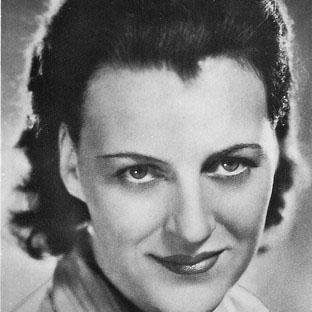
Gracie Fields
by Linda SeidaThe strength of Gracie Fields' superb soprano voice transported the actress and singer from her humble start in a small Lancashire backstreet to her position many years later as a Dame of the British Empire. Born in 1898 above a shop in the town of Rochdale, her 60 years in music and movies survived the war years and a batch of related negative publicity, a battle against cancer of the cervix, and three husbands.Fields, who was born Gracie Stansfield, started her career in traveling British troupes while earning extra money with factory work. Her acquaintance with Archie Pitt, a comedian, gave her fledgling career a boost when he began to promote her in earnest. The two first worked together in a revue called Yes, I Think So in 1915. More revues followed, and in 1923, Pitt wed the future star. Two years later, Fields and Pitt brought a highly successful revue to the Alhambra Theatre in London and went on the road with the production for almost a decade. Fields was officially a star at this point, and quite wealthy as well. In following years, her productions became standing-room-only events. She and Pitt eventually divorced. The singer appeared in a total of 16 films, beginning with Sally in Our Alley in 1931. The song "Sally," which became her theme, was taken from the movie. Interestingly, over the following years, Fields came to despise the ditty. Before her movie career was through, she was pulling in more money per picture than any other actress of the day in the U.K. Movies, however, were not something she enjoyed doing, even though Hollywood beckoned in the form of a Twentieth Century Fox contract. By the end of the decade she was a popular recording star and had toured several continents. Following her appearance in the movie Shipyard Sally in 1939, Fields was diagnosed with cancer of the cervix. Fans across the world showered her with their love and concern, packed into more than a quarter-million pieces of mail. Following surgery, she retreated to the Isle of Capri, accompanied by Monty Banks, a movie director she met on the set of Queen of Hearts, and Mary Davey, a woman who acted as Fields' companion. Still quite ill when World War II erupted, Fields nevertheless insisted on entertaining British troops that were stationed in France. The singer wed Banks, an Italian, in 1940. During wartime, Italians faced being branded enemy aliens, as well as the possibility of internment that accompanied such a label. Fields sidestepped the tricky quagmire threatening her new husband and marriage by accepting concerts in North America. The resulting publicity was furiously negative back home in the U.K., where she was perceived as fleeing her country in its time of need. Despite the roasting her country's newspapers gave her, Fields continued to raise money for England's war effort, and in the end, the total amounted to more than a half-million dollars. She went home to England and performed there twice during the early '40s. She also appeared many times on radio. A heart attack killed Banks aboard the Orient Express in 1950. Fields found her third husband in Boris Alperovici. She passed away in 1979, the victim of a heart attack.
